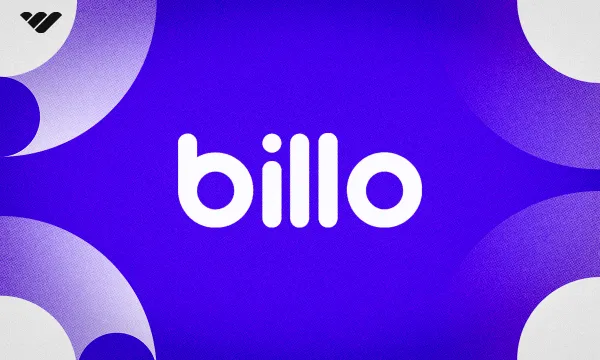If you’ve got some knowledge to share or a digital product to sell alongside your content, choosing the right platform can be the difference between it being a side hustle or a bona fide business in its own right. Kajabi is one of several platforms that can help you grow an online business, but it may not be perfect for you or the message you’re trying to spread.
In this article, we’re going to take a look at why you might want to look beyond Kajabi, then give you ten solid options to help you find that perfect fit!
A quick Kajabi overview
Kajabi is a content creation platform that helps creators monetize digital products such as courses, podcasts, and memberships and turn these ventures into full-fledged online businesses. It helps creators focus on their products and communities by making diversification easy, providing templates for things like landing pages, and scaling businesses organically.
Launched in 2010, Kajabi has scaled up to serve tens of thousands of creators, processing over $6 billion in sales for them. The platform helps them build their businesses from the ground up, starting with website and landing page builder tools all the way to marketing essentials like email and funnels. It also takes care of payments and analytics, positioning itself as an all-in-one creator platform.
Is Kajabi right for you?
Kajabi is an extremely appealing proposition for creators and has a sterling reputation in the industry, but that doesn’t mean it’s perfect for you. The market leaders in any given industry tend to have the freedom to compromise on their product, and there are several ways in which Kajabi’s competitors have them beat.
We’ve got an in-depth look at what Kajabi is and how it works here, but the gist of it is that thanks to Kajabi’s steep flat fee schedule, you’ll need to be bringing in quite a lot of money through your digital products for Kajabi to be worth it.
Kajabi’s most basic payment plan will set you back at least $119 if you choose to pay in an annual lump sum, and the platform highlights its $159 plan as being its most popular. If you’re a creator who’s starting from scratch or just starting to see initial signs of growth from your side hustle, that sort of expense just may not make financial sense.
On top of that, Kajabi isn’t quite as strong on the discoverability front as some of its main alternatives are. A platform helping you to grow and scale your content should also help you build your audience and revenue, and have a way for site visitors to find your listing. Kajabi doesn’t help at all in this regard, so the onus of building reach falls squarely on your shoulders.
Kajabi alternatives at a glance
| Platform | Pricing | Points to Consider |
|---|---|---|
| Whop | Free + 3% per transaction | Lets you sell any type of digital product including memberships, communities, podcasts, digital downloads and more |
| Thinkific | Starts free, $149 monthly for full-feature plan | Specializes in selling courses |
| Podia | Starts at free + 10%, full plan costs $59 per month | Effective email marketing that goes with the look and feel of your store template |
| Teachable | Starts free, full plan costs $119 per month | Drag and drop course builder compares well to Kajabi |
| Skillshare | Apply to Skillshare | Your course viewers are platform subscribers, and you get a cut of revenue—so you need broad appeal to Skillshare visitors in order to succeed |
| Udemy | Apply to Udemy | Direct competitor and similar model to Skillshare |
| Patreon | Starts at 8% per transaction | Specializes in memberships and you deliver exclusive content on the platform |
| Memberful | $49 per month plus 4.9% transaction fee | Focused on memberships too but closer to Kajabi than Patreon is |
| Gumroad | 10% per transaction | Sell almost any digital product, similar to Whop |
| LearnWorlds | $249 per month for the full plan | Premium option for selling courses |
10 exciting Kajabi alternatives
#1. 🏅Whop
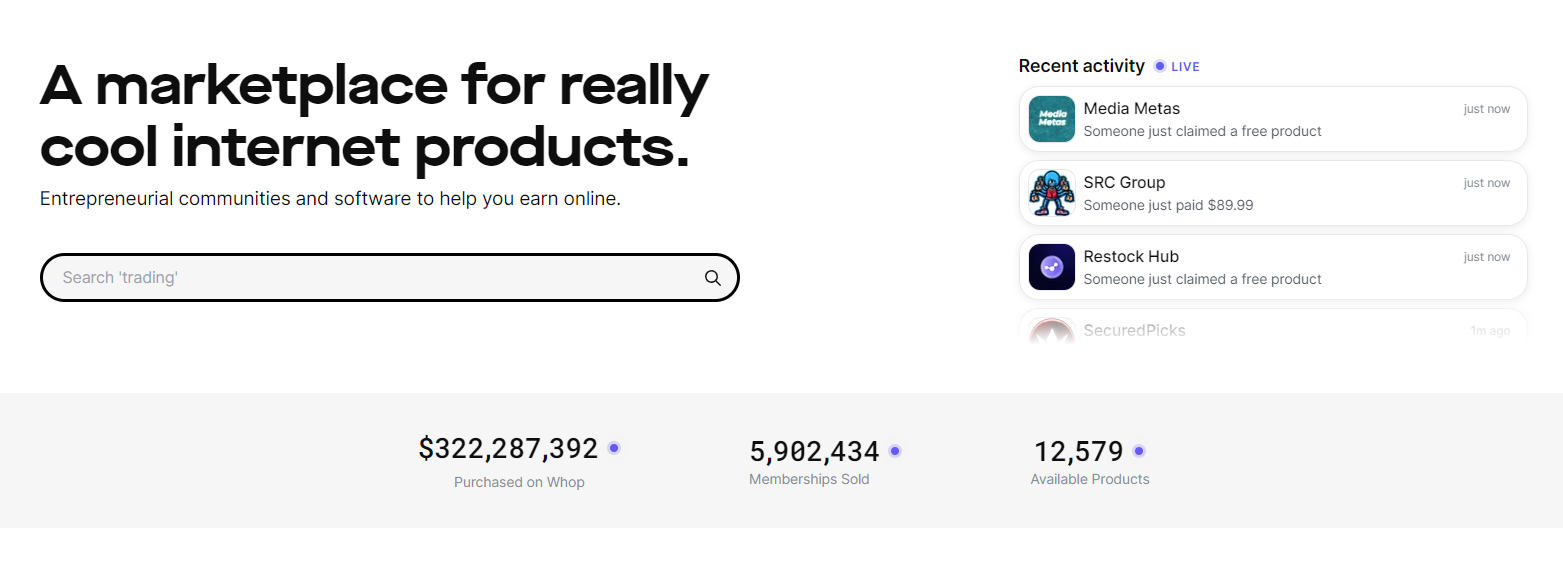
Whop is a creator monetization platform that has a digital marketplace, and helps creators in much the same way as Kajabi does, streamlining all of the processes that take valuable time if you were to do them yourself. It only takes a few minutes to get set up with a full-fledged store on Whop, and you can populate it with different digital products and tons of pricing options very easily.
In fact, Whop takes the ecommerce experience to a whole new level by letting you sell just about any digital product you can imagine or create. Whether it’s access to your community or a gated part of your website, downloadables like eBooks, online courses or webinars, podcasts, memberships, or even niche tools like TradingView indicators and bots, you can sell it with Whop.
Discoverability is also taken care of with the Whop marketplace since visitors browsing the site will see sellers and products first and foremost, so just getting listed on Whop will score you more impressions. The entire digital fulfillment process is taken care of too, meaning that all you need to do is keep creating!
If all of that wasn’t enough, Whop is entirely free to use—and features best-in-class pricing of just 3% per transaction. That means Whop isn’t eating into your wallet with steep fees, and is a great option for new creators and established brands alike.
Whop features at a glance:
- Sell any sort of digital product
- Store and course builder tools make it easy to set things up
- Affiliate marketing to help you grow
- Free graphic design
- 24/7 web support and an automatic dispute fighter tool
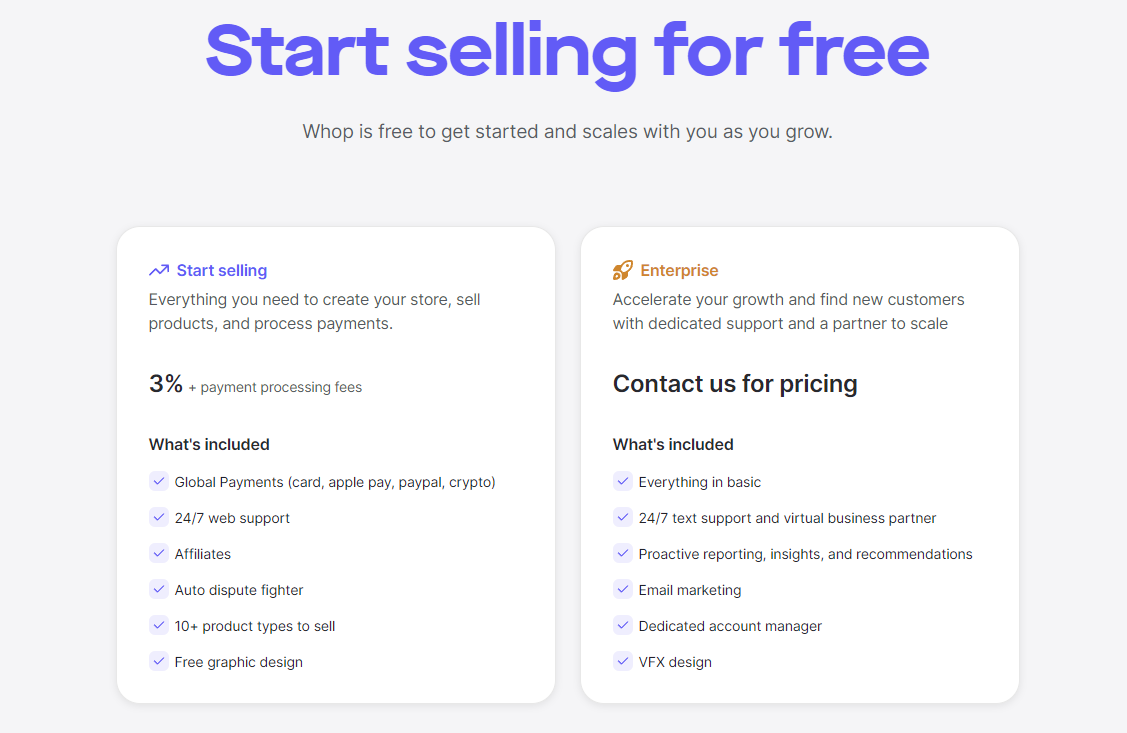
Pricing: Free to use, only 3% fee per transaction.
Pros: Whop allows you to sell any sort of digital product and is totally free to use. The 3% fees it charges are also far cheaper than every other option on this list.
Cons: Whop isn’t quite as established as Kajabi is yet, but it’s gaining ground fast!
#2. Thinkific

Thinkific offers a single, scalable platform to creators aiming to sell a variety of digital products, letting you choose between diversifying your income streams or perfecting a single one to make the most of your online business.
The platform makes it easy to set up custom web themes and provides you with your own domain, and you can work with the Thinkific app to make your courses and communities even more convenient for a busy audience. Quizzes, assignments, and the ability to go live can really give you all the options when you sell courses, and there’s plenty of help with marketing since you can set up bundles, coupons, and cross-sell your products.
Features:
- Thinkific makes courses easy to plot out and build
- Simple, effective website themes for easy customization
- Coupons, discounts, affiliates, and memberships all available on higher price tiers
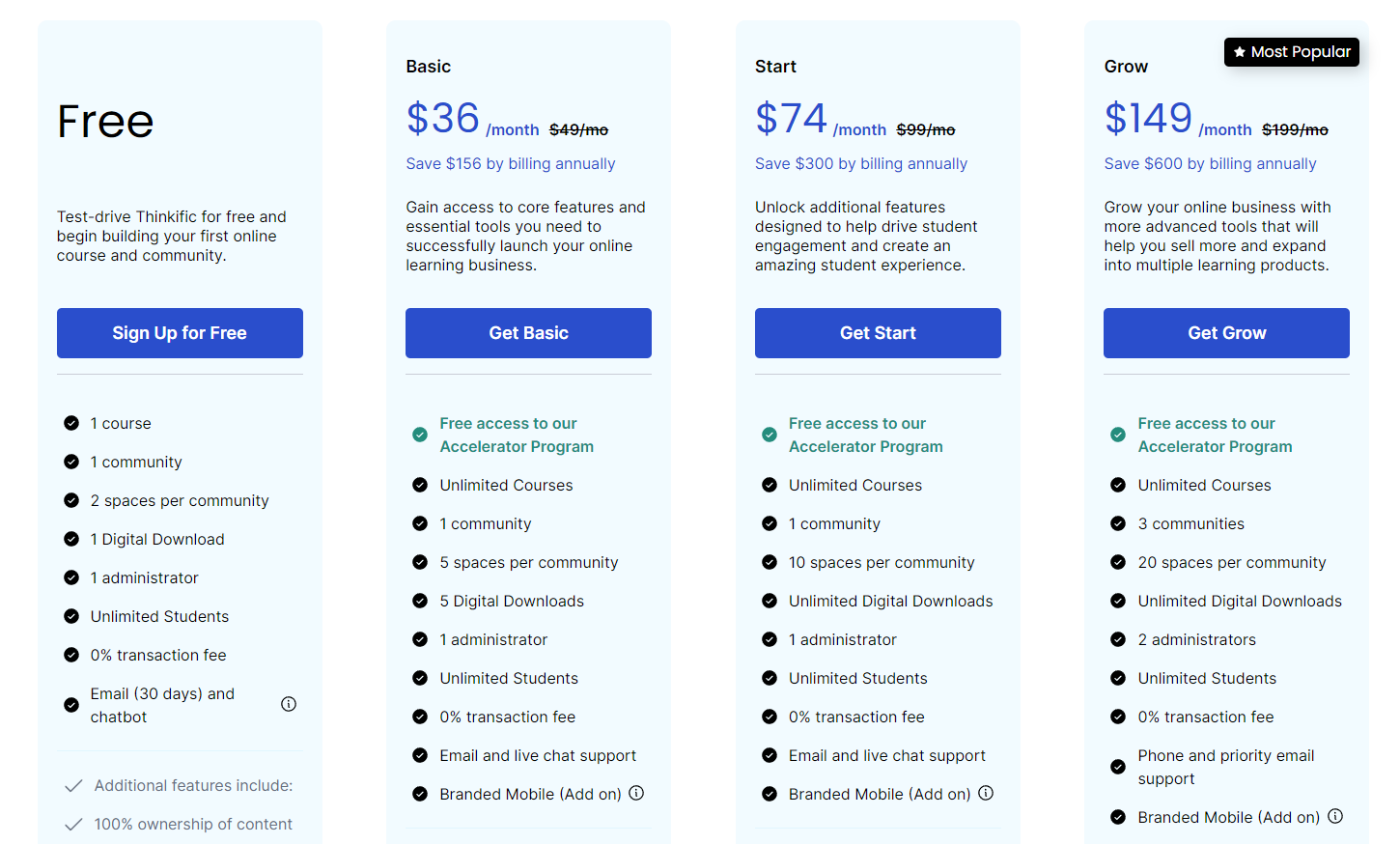
Pricing: You can test drive Thinkific completely for free, and none of their plans involve transaction fees. 'Start' is probably the most powerful plan if you’re in the early stages of your online business, but think about 'Grow' if you’re selling courses because of features like the bulk emailer. There are also plans that go beyond, with Expand rated at $374 per month and bespoke pricing also available.
Pros: Thinkific has a lot of great features for various types of content, and is especially good if an online course is your main product.
Cons: By the same token, many of Thinkific’s features don’t translate as well to other sorts of digital products, and you may be paying for lots of features you don’t need.
#3. Podia
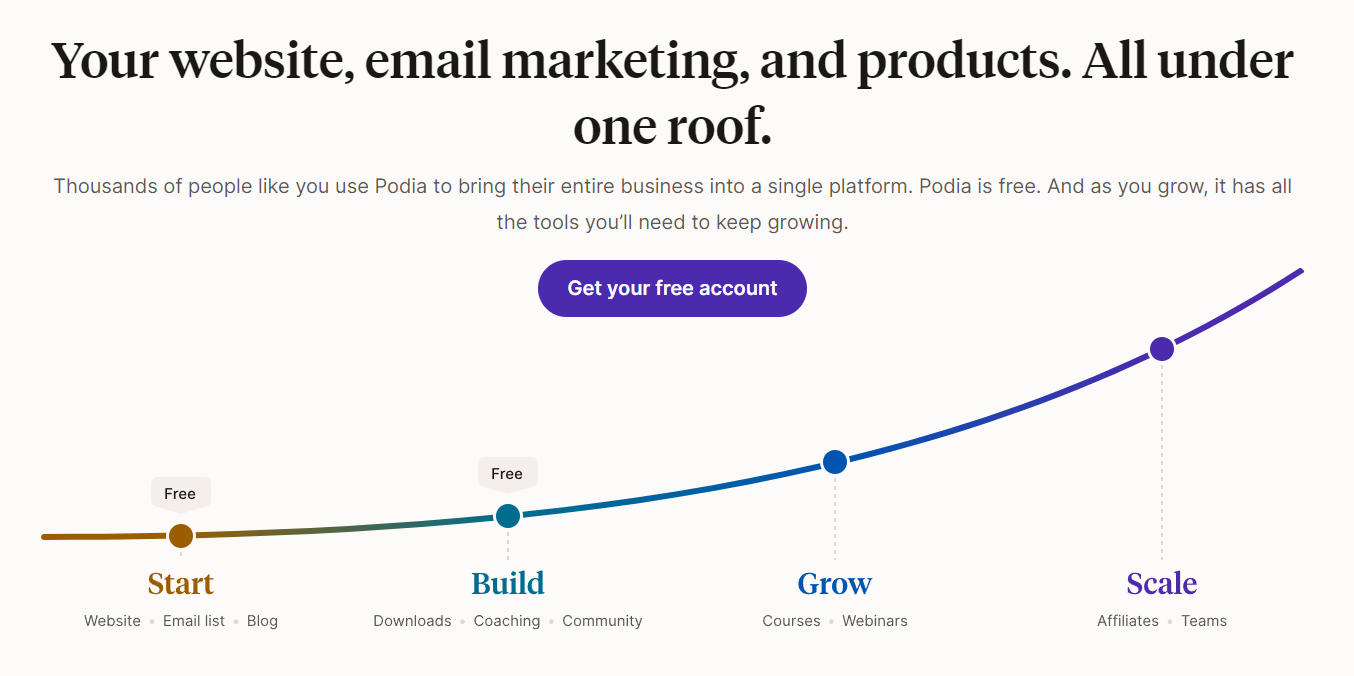
Podia is a creator platform that, like Kajabi, offers specialized options for major digital product categories such as courses and memberships. The platform lets you do just about everything Kajabi does, and it gives you a free plan if you’ve only got a single product to sell.
Today, one of Podia’s key strengths is its website builder, allowing you to set up a professional, good-looking front end for your digital product store in minutes. You can sell straight from this site, and run email marketing campaigns that tie right in with the look and feel of your online store.
Podia also offers a built-in affiliate marketing program, allowing you to really leverage multiple marketing angles to grow your reach.
Features:
- Quick to set up and easy-to-use website builder
- Email marketing and affiliate program
- Premium payment plan compares well with Kajabi’s pricing
- No coding required
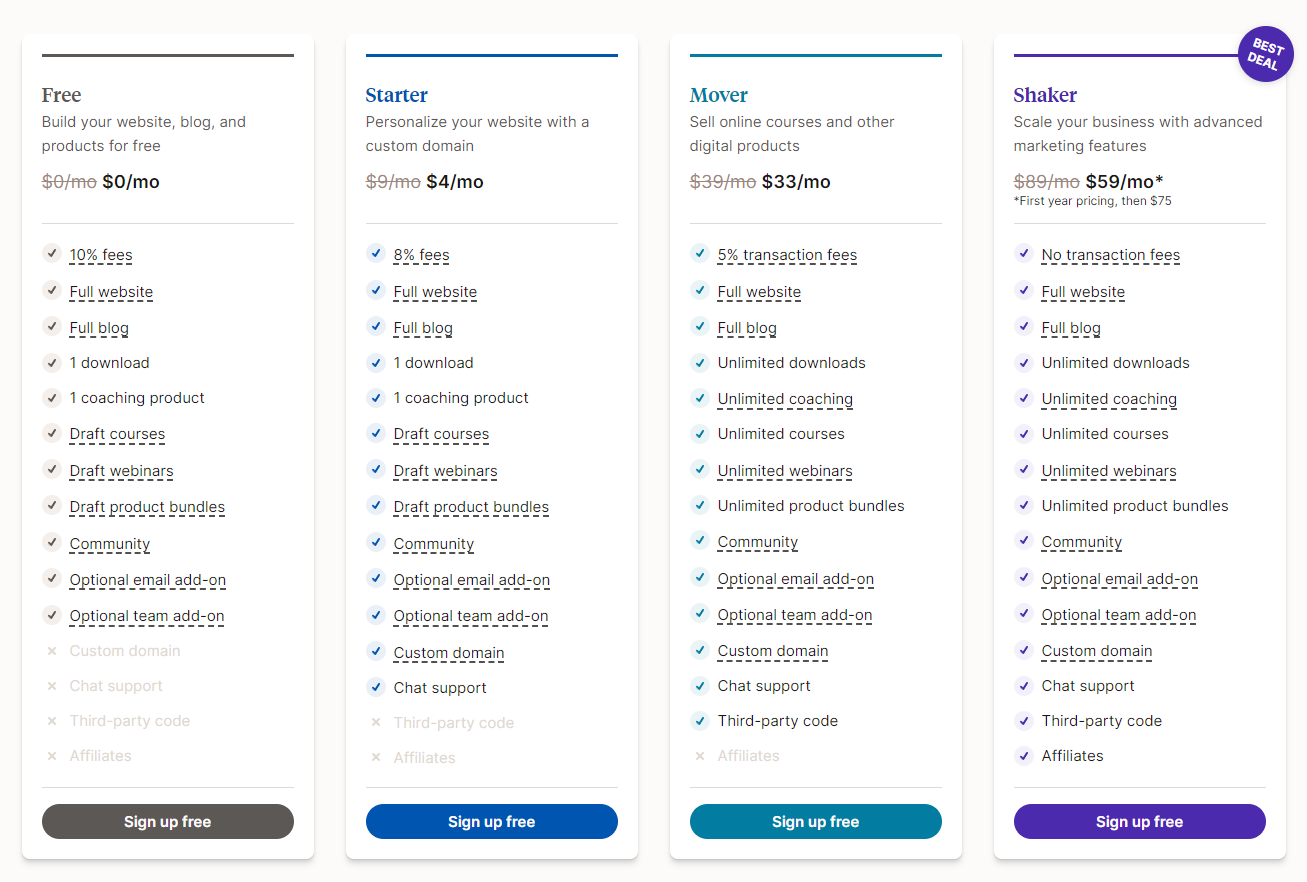
Pricing: Podia offers a free plan with a single digital download and coaching product, but for more options or a custom domain you’ll have to start making payments. Podia charges both flat fees and transaction fees, but you can ditch the latter if you sign up for their Shaker premium plan at $59 for the first year.
Pros: Email and affiliate marketing are part of Podia’s offering, although you’ll have to be on their premium plan to get access to affiliates.
Cons: The different plans outside of Shaker are extremely limited and charge high transaction fees, and the platform’s design templates are limited.
#4. Teachable

Teachable is a very similar offering to Kajabi, and shares a lot in common with Thinkific as well in how it focuses on online courses. It’s free to get started on the platform and gives you plenty of ways to transfer your knowledge across to your community, and helps you in several ways when it comes to scaling your offering.
Teachable features a simple course builder that uses a drag-and-drop interface, lets you customize your store and landing page, and integrates easily with lots of tools—some of which are bound to already be part of your existing tech stack.
Features:
- Simple course builder
- Templates for an online store page
- AI curriculum generator to help you build your products
- Lets you offer digital downloads
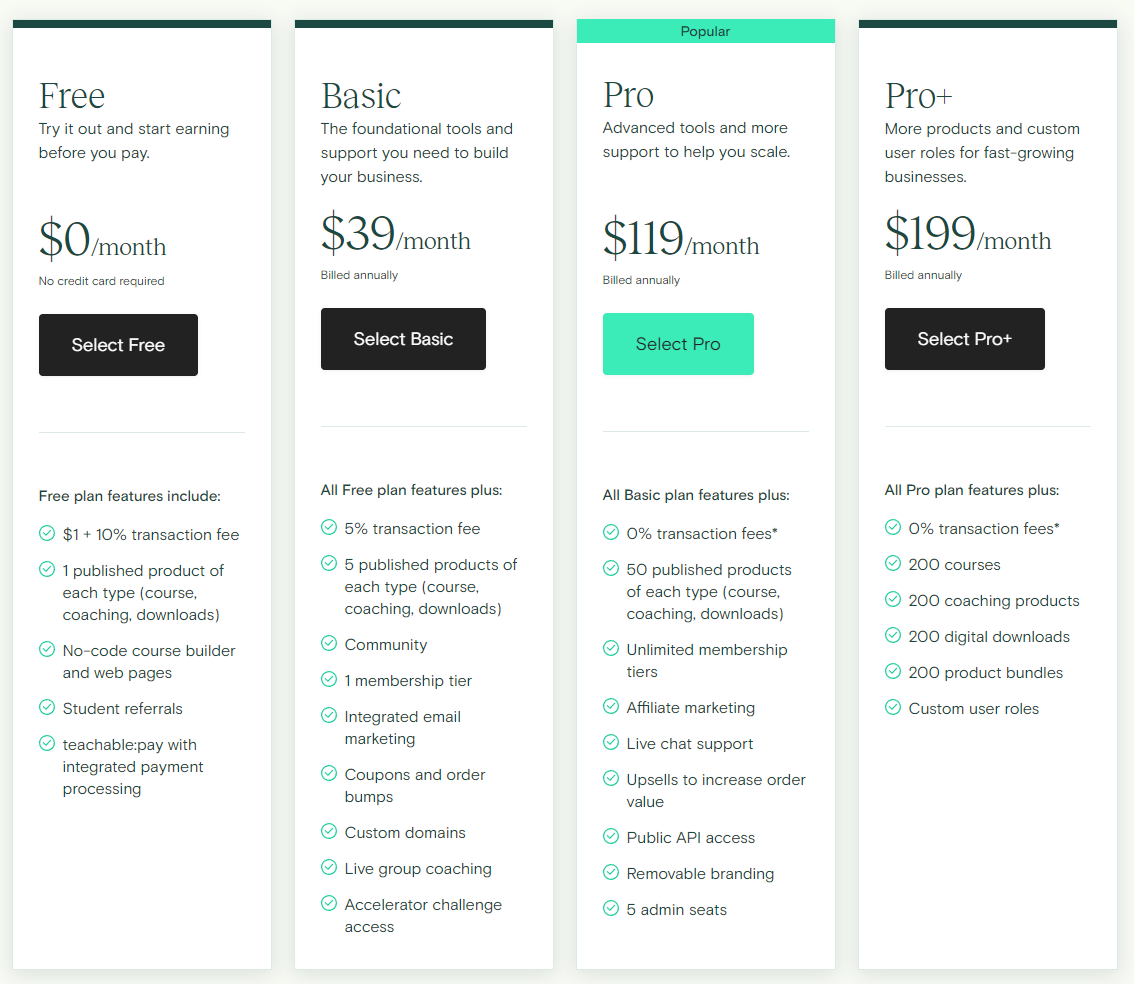
Pricing: Teachable offers a free trial plan where you can offer a single published product of each type. Basic has a transaction fee as well as a $39 monthly charge, but Pro and Pro+ get rid of the transaction fees.
Pros: Teachable does courses extremely well, and has all of the features to complement them including email marketing, affiliates, digital downloads, and more.
Cons: You’ll need to go all the way up to Pro to unlock most of the features you’ll need for your business, and that’s expensive at $119 per month billed annually.
#5. Skillshare

Skillshare is a well-known platform for online courses and the transfer of all manner of skills, so if you’re an expert in a particular niche then this platform’s definitely in the running. It’s been around for a while and is very established in the online education niche, and you’re likely to find an audience regardless of what you want to teach.
In that sense, Skillshare helps a lot since not many of the platforms on this list offer that sort of discoverability. The platform also helps you to perfect your product, featuring a huge amount of resources designed to elevate the quality of your courses—and thereby the quality of the products on their own site, of course.
Skillshare uses a subscription model, with members paying a fee to the platform, which then transfers some 20% (according to Skillshare themselves) of that revenue on to teachers based on a selection of metrics like minutes watched and engagement.
Features:
- Extensive resources for Skillshare creators
- Well-known platform with plenty of site visitors
- Simple and easy creation of courses
Pricing: Apply to Skillshare.
Pros: Extensive audience, established platform, easy to set up your courses.
Cons: You need to apply to Skillshare to get started and wait for approval, and how much you earn is totally dependent on the platform and your content’s popularity with Skillshare members.
#6. Udemy

Like Skillshare, Udemy is an extremely popular course platform that brings an established audience to you if you get listed. The approach taken by Udemy differs significantly, though, with the platform letting users purchase courses rather than subscribing to the platform itself. This simplifies revenue a little, although with Udemy Business it’s a subscription model and engagement-based earnings that you’ll have to contend with.
Udemy has an excellent reputation when it comes to quality courses, and it has lots of resources for you to improve your product. It’s also easier to get started on Udemy, with fewer by the way of approvals and so on in the way of signing up.
Features:
- Established platform with a vast audience
- Plenty of instructor support and teaching resources
- Easy to get set up and upload courses
Pricing: Apply to Udemy.
Pros: Plenty of access to analytics and more information about learners, established platform, easy to get started.
Cons: Like Skillshare, revenue can depend on the platform, especially on Udemy Business.
#7. Patreon

Patreon is one of the best known creator platforms in the membership and subscription niche, offering all manner of creators a way to monetize their audience. By providing a little extra (or different) content on Patreon, you can give your biggest fans a way to help you keep creating.
Many creators use Patreon in this manner and consider it a vital revenue stream, underlining just how powerful a community can be in powering content creation. If you don’t already have a membership program, you may be missing out—your core fans are likely going to be thrilled to be able to pay you a little every month for more content, and part with that money far easier than for something like a Netflix sub.
Features:
- Customizable page
- Upload different digital products
- Let fans subscribe to your page for recurring revenue
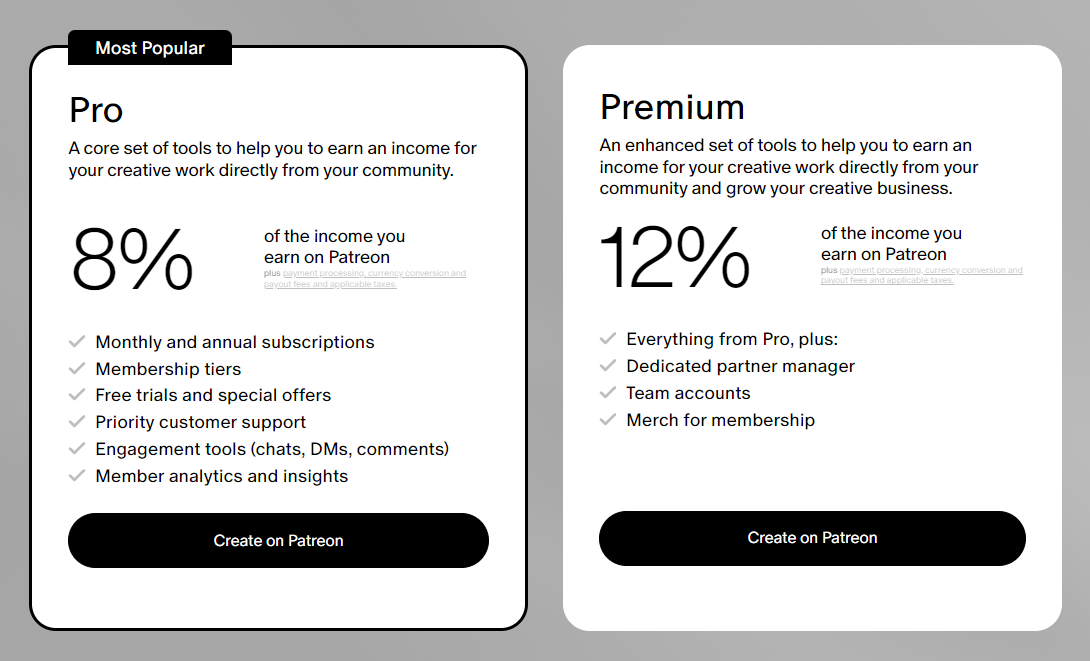
Pricing: Patreon has two main pricing tiers which charge 8% and 12% of your revenue, and that’s on top of payment processor fees. Their digital store takes 5%.
Pros: Big name in the memberships business, offers plenty of customization and good customer service.
Cons: Extremely expensive compared to Whop, which does a lot more for far cheaper fees.
#8. Memberful

As its name suggests, Memberful is all about bringing creators revenue by implementing a membership program, allowing followers to support you directly in the most convenient possible way. The type of content you create or the niche you fall in doesn’t matter—if you want to monetize an audience, Memberful can help.
Memberful does go a little further than being memberships-only, offering a landing page builder, custom domains, as well as different content options. Still, Memberful focuses on and does memberships really well, featuring easy-to-use account management software and solid payment processing that keeps your member fees coming in.
Features:
- Reputable membership management platform
- Fast, powerful checking and payment processing
- Various options for member payments
- Make courses, downloads, and newsletters available to members
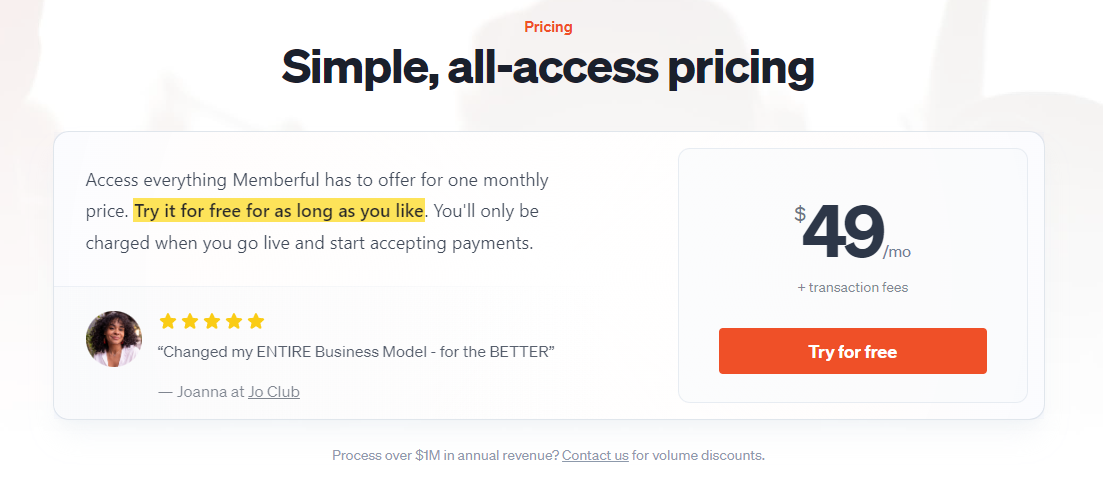
Pricing: There’s only one pricing option at $49 per month, but the devil is in the details—Memberful also levies a 4.9% transaction fee on top of processing costs.
Pros: Excellent platform that is focused on memberships but provides a lot of the tools you need to round out your online business.
Cons: Pricing can be expensive for both starting creators and established ones thanks to the hybrid fee schedule.
#9. Gumroad

Gumroad is a hit ecommerce platform that lets users sell just about any sort of digital product. It’s made waves in the market because of this openness and inclusivity, and it lets creators experiment with different types of products with a suite of powerful business analytics showing what works and what doesn’t.
It’s also really easy to get set up on Gumroad, and they’ve got a simple page editor allowing users to build store pages without having to know code. You can also link Gumroad to your own side, and embed some of their functionality including payment processing. As far as Kajabi alternatives go, Gumroad is simpler in just about every way and lifts all restrictions on what you can sell.
Features:
- End to end ecommerce platform
- Digital tools to help you build a site or link Gumroad to yours
- Sell any sort of digital product
- Email marketing and various automated workflows
- Sales data and analytics
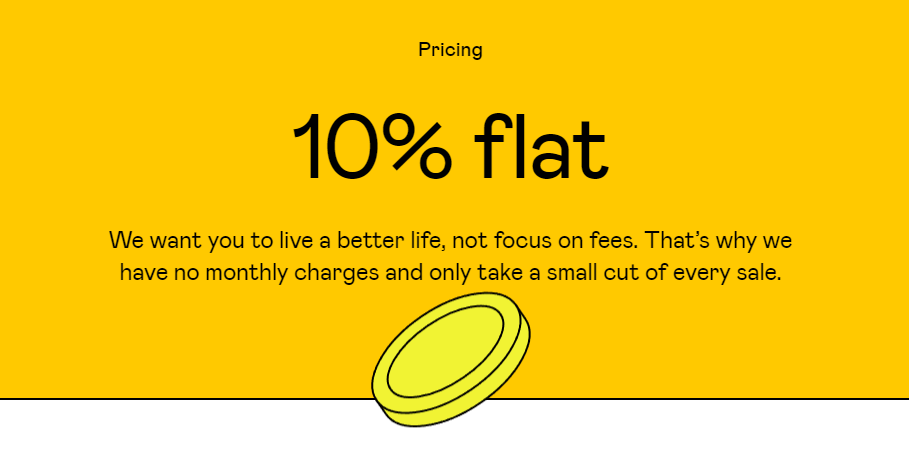
Pricing: Gumroad is essentially free to use, eschewing monthly or annual charges in favor of a flat 10% transaction fee.
Pros: You can sell more digital products than on several other listed platforms, and Gumroad is very easy to use.
Cons: Certain things are restricted, such as prolonged service contracts, and that 10% fee is pretty steep, especially compared to Whop’s 3%.
#10. LearnWorlds

LearnWorlds specializes in online courses, but that includes several extras such as a website builder that helps you get your content looking just right. From bespoke branding and fantastic-looking templates to all sorts of interactive content to use with your courses, LearnWorlds re-imagines the online learning environment in its own unique way.
It’s also possible to sell memberships on LearnWorld although these are imagined as memberships supporting your course content—but there are also tons of options such as 1-click funnels and customized checkouts to ensure that you’re maximizing revenue. LearnWorlds also plays very well with other services, integrating seamlessly with almost all of the top creator tools out there.
Features:
- Various course-building features including interactive content
- Customization of your site as well as the course player
- Array of marketing and sales options
- Easy integration
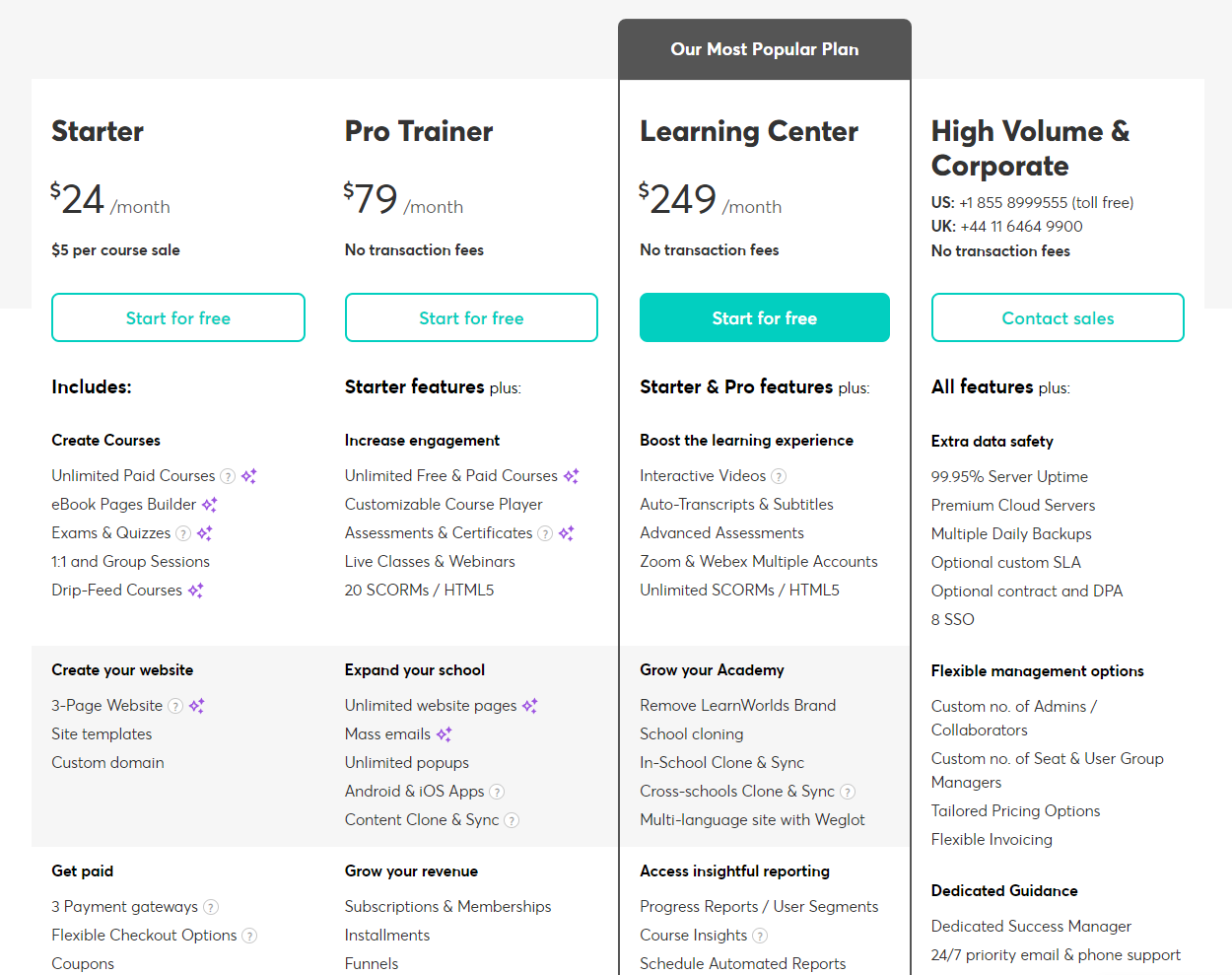
Pricing: Limited starter plan priced at $24 charges an additional $5 per sale, and to make full use of the platform you’ll have to cough up $249 per month billed annually.
Pros: Extremely powerful course-builder and learning platform.
Cons: Pricing is extremely steep on both ends of the scale, and you can’t do too much with other types of digital products outside of courses. Memberships only apply to the $79 plan.
What to look for in a Kajabi alternative
When you’re looking for a Kajabi alternative, there are several areas to look at. However, what sort of weighting you give these options will depend on the nature of your business and where you are in its lifecycle—as we’ve mentioned in this article, a creator who’s just starting off may have very different needs to a content creator backed by an entire team of supporting staff.
Here are a few key areas to keep an eye on when you’re looking for the perfect Kajabi alternative for your business:
- Pricing
This one’s extremely important, because you don’t want to be sharing too much of your hard-earned revenue with the platform you’re dealing with. Some of the alternatives we’ve listed charge flat fees irrespective of your revenue, and some take a transaction fee—but beware of the platforms that do both! You need to be making a certain amount in revenue to make a flat fee worth it, but transaction cuts can hurt too when they start approaching the double-figure range. - Website builder
Unless you already have your own site, you’ll want to make sure that the Kajabi alternative you choose can help you set up a digital store page easily. Anything that takes too many clicks or too long to set up is a waste of your time. - Marketing
Make sure you look at how the platform you choose can help you on the marketing front. Options like email marketing and affiliates can really help, and the ability to set up things like coupons can be more valuable than you might realize. Discovery is also a big deal, and some platforms can win you new customers just by getting listed. - Digital product range
Every digital product you sell is a new revenue stream, so make sure your chosen Kajabi alternative doesn’t restrict what you can sell. Why choose between courses, memberships, downloads, ebooks and anything else when “all of them” is a legitimate option?
Whop: The ultimate Kajabi alternative

If you want to take your side hustle or passion project to the next level, you’ll need a great Kajabi alternative to help you make it a thriving online business. This needs to come with a variety of supporting services and tools, the right pricing, and the perfect product range for your content—so you’re missing out if you don’t take a look at Whop!
Whop leads the way in pricing and product diversity, appealing to creators of all sizes with just a 3% fee, giving you all the tools and freedom that you need to take your business to the next level. Talk to the team or check out Whop today.
FAQs
What is the best Kajabi alternative?
We’re rating Whop as the top Kajabi alternative thanks to a combination of factors such as pricing, customer service, and digital product options. It does everything Kajabi does and more, even though it hasn’t been in the market for quite as long.
Are most Kajabi alternatives cheaper?
Yes, Kajabi is one of the top names in the industry and has established itself at the premium end of the scale. You can find several cheaper alternatives in terms of monthly fees, or go the other way by picking a platform that charges a percentage of transactions instead.
What are the cons of Kajabi?
Kajabi is definitely on the expensive end of the scale, and it can limit you in terms of what products and services you can offer. You’ll also need to pay for a lot of integrations and features you can get as part of the standard package with other alternatives.


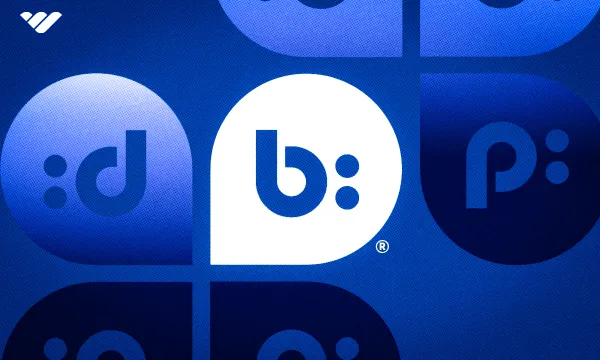

![10 best free stock trading apps [2025]](/blog/content/images/size/w600/2023/09/trading-apps.webp)
